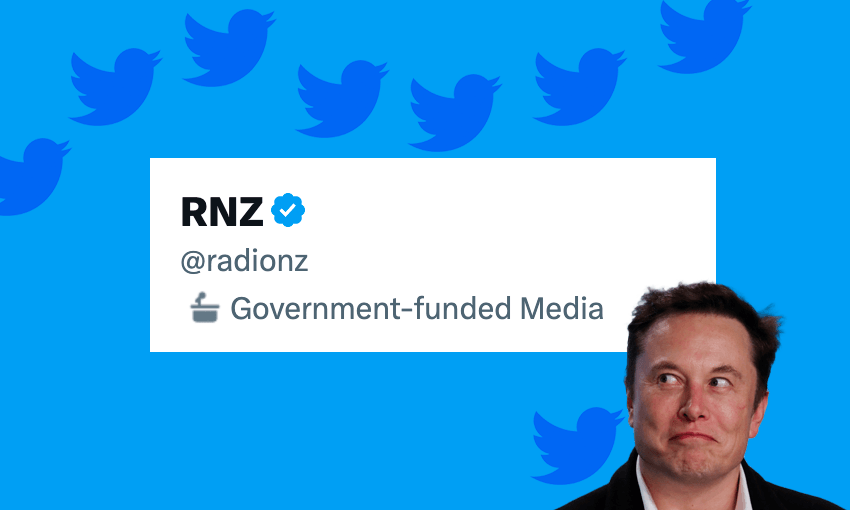The social media network has tagged RNZ as ‘government-funded media’, prompting the broadcaster to consider joining others in ditching the platform entirely. Stewart Sowman-Lund reports.
State-funded broadcaster RNZ is considering its options after the sudden appearance of a new “government-funded media” tag on its Twitter profile.
The news outlet, which is wholly funded by NZ On Air but editorially independent, has strongly refuted the label and its connotations, meaning RNZ could be about to enter into a public spat with Twitter similar to what’s been seen recently in other countries around the world.
The tag, which first appeared on RNZ’s main Twitter account today, can be seen prominently above the outlet’s bio and above every single tweet. So far, other RNZ Twitter accounts, including those for its news output, have not been tagged.
While RNZ is currently the only local media outlet to have been given a new label, it’s joined a number of other public media companies around the world. Twitter has been rolling out the new tags over recent weeks alongside a series of confusing changes to the “blue tick” (it used to signify someone was a public figure, but now it could mean they’re just paying for Twitter’s subscription service “Blue”).
Public media is generally defined as media whose primary mission is public service. While it is often funded, directly or indirectly, by taxpayers or government sources, it retains editorial independence.
According to Twitter, outlets listed as being “government-funded” received some or all of their funding from the government “and may have varying degrees of government involvement over editorial content”. Outlets can also be deemed “state-affiliated”, which indicates that a government has “control over editorial content through financial resources, direct or indirect political pressures, and/or control over production and distribution”.
They can also be publicly-funded, meaning they “receive funding from license fees, individual contributions, public financing, and commercial financing”.
RNZ’s head of content Megan Whelan told The Spinoff that it disputed the characterisation and would be considering what to do next. “RNZ’s editorial independence is enshrined in our charter and editorial policy. Twitter’s own policy defines government-funded media as cases where the government ‘may have varying degrees of government involvement over editorial content’, which does not apply to RNZ,” she said.
“Not only is our editorial independence protected by the law, we guard it vigorously. Over the next few days, we will be considering our options, including talking to Twitter to have the label removed or revised, or as other public media around the world have done, leave the platform.”
Within the last week both PBS and NBR in the United States announced they would be quitting Twitter over the introduction of the labels. NPR was initially given the state-affiliated tag, putting it in the same category as propaganda outlets from Russia and China.
Twitter soon changed this to government-funded, but it wasn’t enough to keep NPR on Twitter. An internal email from NPR’s chief executive John Lansing, seen by CNN, said: “It would be a disservice to the serious work you all do here to continue to share it on a platform that is associating the federal charter for public media with an abandoning of editorial independence or standards.” All 52 NPR Twitter accounts have since gone dark.
PBS similarly confirmed it had stopped tweeting after it first learned of the change and had “no plans to resume at this time”.
In the UK, the BBC also pushed back after it was initially labelled government-funded. The broadcaster said this wasn’t strictly true as its funding comes from a licensing fee paid by UK households. A publicly-funded tag was subsequently added and Twitter’s owner Elon Musk gave a lengthy interview to the BBC to explain his decision-making. The goal with the labels was to be as “truthful and accurate as possible”, Musk said. “I know the BBC is generally not thrilled about being labelled state media,” he added.
Other outlets like Canada’s CBC and Australia’s ABC have today reported the new government-funded tag appearing. “Twitter’s own policy defines government-funded media as cases where the government ‘may have varying degrees of government involvement over editorial content,’ which is clearly not the case with CBC/Radio-Canada,” a spokesperson for the outlet said, while ABC said it was “liaising” with Twitter over the changes.
FYI: The ABC is a publicly funded broadcaster, governed by the ABC Charter which is enshrined in legislation. For more than 90 years the ABC has always been and remains an independent media organisation, free from political and commercial interests.
— ABC News (@abcnews) April 17, 2023
On Twitter itself, the decision to label RNZ as government-funded has been met with a range of responses from followers. Some believed the descriptor was honest and thanked Musk for making moves to identify which media outlets received government money. Others were critical of the move, such as physicist Shaun Hendy who suggested the label inferred a “degree of editorial control by government”, which RNZ refuted.
Lawyer and commentator Graeme Edgler said that regardless of whether the label itself was necessary, he believed it to be factual. “RNZ is straight up government funded,” he tweeted. “I would not say the same about TVNZ, which is government owned, but indirectly government funded at best.”
TVNZ has, thus far, not been given any label by Twitter to signify its connection to the state. TVNZ is government-owned but, unlike RNZ, is largely commercially funded through advertising.
All New Zealand media outlets have a strong presence on Twitter, with RNZ tweeting about twice every hour. Some outlets have, however, chosen to phase out the use of Facebook. Stuff publicly announced it would be leaving the platform in 2020 in response to growing concerns over misinformation (it briefly, though accidentally, rejoined the platform at the start of this year). RNZ has for some time now limited comments on its Facebook posts.
A request for comment to Twitter on RNZ’s threat to leave the service was responded to with a now-customary poo emoji.




